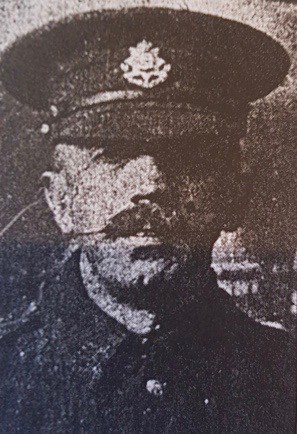
© Dorking Advertiser
Thank you to Westcott Local History Group for allowing Dorking Museum to publish their First World War research.
Alfred James Hopkins was born in Lavington, Wiltshire in 1880, the son of William and Eliza Hopkins of Milton Brook and was a house painter before joining the Army. He enlisted at Guildford and joined the 9th (Service) Battalion, East Surrey Regiment which had been formed at Kingston-upon- Thames in September 1914. After training at Worthing, Shoreham and Blackdown, the Battalion arrived in France on 1st September 1915.
After a brief stay at Hazebrouck in Belgium, the battalion moved to the village of Houtkerque and the regimental diary records that it was here, on 3rd October 1915, that a draft of 200 men arrived as reinforcements. Alfred Hopkins’ record shows he arrived in France on 6th October so he would have joined the battalion shortly afterwards. On 19th October the battalion relieved 9th Royal Sussex in the front line. From that time onwards they served continuously in the Belgian sector of the front until September 1916 when they moved to the Somme area. After a short period in reserve at Montauban they fought with distinction in the Battle of Delville Wood.
By May 1917 the 9th East Surreys were again in the Belgian sector – at Poperinghe, near Ypres. On 31st July Field Marshal Haig opened his assault on the Ypres Salient; this was the start of the Battle of Passchendaele. The battle opened with a massive artillery barrage which destroyed dykes; heavy rain turned the ground into a quagmire and the troops had to fight in appalling conditions. From 2nd to 7th August the 9th East Surreys were at Zillebeke under heavy fire. These extracts from the regimental diary vividly record the action and conditions the men had to endure:
‘The enemy’s artillery was very heavy both at dawn and dusk on each day both on the front, support and reserve lines and on all communication trenches in between…….Rain continued to fall during the greater part of this tour, causing very thick mud to form, except for sunny intervals during the last two days…….Great credit is due to almost every man in the battalion for the energetic way in which he worked. No matter whether they carried rations, water, wounded or anything else they stuck to their jobs in the terrible conditions and always won through with a smile.’
On 5th August the battalion was repeatedly attacked by German bombing parties who rushed their trenches. The attacks were repelled in desperate fighting, but eventually some of the posts had to be abandoned. Later that morning, the Commanding Officer, Lt Col H.V.M. de la Fontaine came up to the front line to check the situation and was killed by a sniper. He was described as ‘A personal friend of, and beloved by, every man in the battalion, he died a soldier, carrying out his duty and anxious for the safety of his men.’ The battalion continued to hold their trenches until they were relieved by 3rd Bn The Rifle Brigade at the end of their tour on 7th August.
In recording casualties most regimental diaries listed the Officers by name and simply recorded the number of Other Ranks who were killed or wounded. The 9th East Surreys were an exception to this; they meticulously recorded the ranks, names and regimental numbers of all casualties, regardless of rank. During the seven days from 2nd to 7th August 3 Officers and 35 Other Ranks were killed; 5 Officers and 57 Other Ranks were wounded. Pte Alfred James Hopkins was listed among the Other Ranks who were killed on 5th August. His name is inscribed on Panel 34 on the Menin Gate Memorial at Ypres which commemorates 54,000 officers and men of the British and Commonwealth Forces who died in the battle and who have no known grave.
The 9th East Surreys served on the western front for the rest of the war. Delville Wood and Passchendaele both feature in the Regiment’s accredited battle honours. One of the officers wounded in the action at Zillebeke was 2nd Lt R.C.Sherriff who later became a successful playwright and author; his best-known play was Journey’s End which was based on his experiences in the trenches.
| Born | Lavington, Wiltshire | |
| Lived | Dorking, Surrey | |
| Son of | William and Eliza Louisa Hopkins, of Milton Brook, Dorking, Surrey | |
| Regiment | 9th Battalion. East Surrey Regiment | |
| Number | 827 | |
| Date of Death | 5th August 1917 | |
| Place of Death | Zillebeke, Belgium | |
| Cause of Death | Killed in action | |
| Age | 37 | |
| Memorial | Ypres (Menin Gate) Memorial, Ypres, Belgium |

